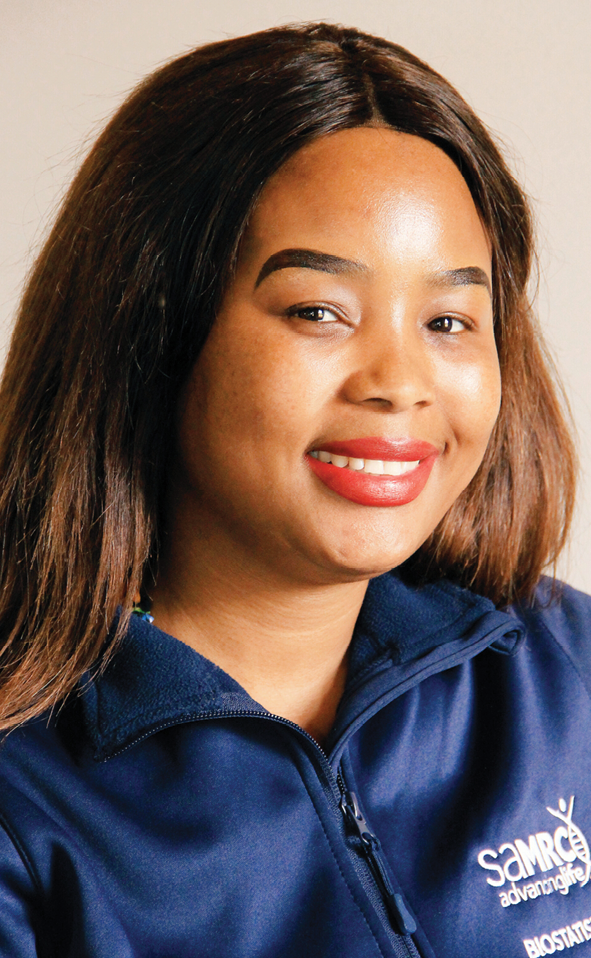Dr Nobuhle Mchunu’s story of achieving academic and career goals in the face of adversity is truly inspiring. It demonstrates how far people can go if they make optimal use of government programmes to improve their lives.
The 32-year-old Mchunu hails from Elangeni village in Muden, KwaZulu-Natal. She works as a Senior Statistician Competent, also known as a Biostatistician, at the South African Medical Research Council (SAMRC). 
Biostatisticians use statistics and mathematics to gather and evaluate data for biology and public health uses.
Among the funding and support programmes that helped Mchunu escape poverty and rise to success are the South African Social Security Agency (SASSA) child support grant, the National Student Financial Aid Scheme (NSFAS), and the National Research Foundation (NRF) scholarship.
In an interview with Vuk’uzenzele, Mchunu summarised her life story: “I am the eldest in my family, and I have three siblings. We were raised by our mother. Our father passed away when I was just nine years old.”
Because her mother was unemployed, the Mchunu family relied on child support grants to survive. After completing her primary school studies, her mother took Mchunu to Pietermaritzburg to stay with her aunt so that she could receive better education in high school.
“After completing matric in 2010, I could not further my studies for about two years, even though I passed very well. At the time, I could not qualify for NSFAS because it prioritised students from previously disadvantaged schools. I attended a former model C school, but I was not paying school fees because my aunt and my mother had applied for tuition exemption. We could not afford to pay school fees,” she explained.
Securing funding
Two years later, one of her high school teachers learned about her struggle to secure funding. The teacher helped her apply for NSFAS, emphasising that Mchunu had not paid any school fees throughout her high school years because she came from a disadvantaged background.
“My application was approved in 2013, and I enrolled at the University of KwaZulu-Natal (UKZN) for a Bachelor of Science (BSc) in Chemistry but switched to a BSc in Applied Mathematics and Statistics in the second semester of the first year,” said Mchunu.
After completing her degree, she successfully applied for the NRF scholarship and enrolled for a BSc (Honours) in Statistics at UKZN. She completed her honours degree in 2016 and began a Master of Science (MSc) in Statistics at UKZN in 2017. During this time, she received a scholarship from the Master’s in Biostatistics Bursary Award, part of the Developing Excellence in Leadership, Training, and Science in Africa Consortium for Advanced Biostatistics Training programme.
“My scholarship was worth R150,000, and I used some of the funds to build our family home. I was also working as a tutor at the university while studying to sustain myself,” she explained.
In 2018, Mchunu was accepted for the Centre for the AIDS Programme of Research in South Africa (CAPRISA) Centre of Excellence Fellowship, during the second year of her MSc studies. This fellowship provided a stipend of approximately R10,000 per month, which helped support her family.
“Unfortunately, my mother passed away in the first quarter of 2018. Shortly afterwards, I found out I was pregnant. This meant my grandmother had to head the household while I was studying, as I still had to provide for my siblings,” she explained.
In 2019, the SAMRC’s Biostatistics Capacity Development programme offered Mchunu a scholarship worth R200,000 for her PhD studies. This was funded in partnership with Building Academic Partnerships for Economic Development. During this period, she was still with CAPRISA and the UKZN as a PhD candidate.
In the same year, she was offered a permanent entry-level job as a Statistician at the SAMRC. Two years later, she was promoted to a Seasoned Statistician. In 2023, she was promoted again, this time to the position of Senior Statistician.
In April this year, Mchunu was appointed Senior Statistician Competent, a position she still occupies. She completed her PhD in September 2024.
For more information, visit:
NSFAS: www.mynsfas.org.za
SASSA: www.sassa.gov.za
NRF: www.nrf.ac.za
CAPRISA: www.caprisa.org

 Facebook
Facebook Twitter
Twitter WhatsApp
WhatsApp